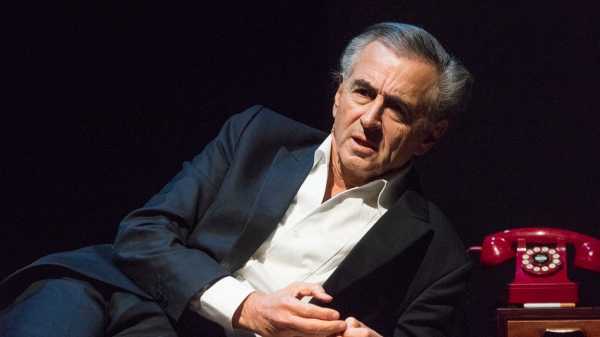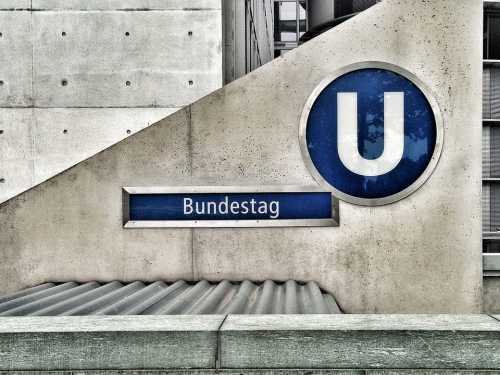
There has always been a strong touch of theatre to Bernard-Henri Lévy. Known as B.H.L., the French philosopher, public intellectual, timber-fortune scion, style icon (he is the patron saint of the unbuttoned collar), and occasional punching bag (Garrison Keillor once called him “a French writer with a spatter-paint prose style and the grandiosity of a college sophomore”) is a walking, pontificating spectacle. So perhaps it was inevitable that he would take to the footlights. On Monday night, he makes his Off Broadway début, at the Public Theatre, in a one-night-only performance of a solo play called “Looking for Europe.”
“The pitch is the following,” Lévy said, by phone, from Paris the other day. “It’s a writer, a French writer, who is supposed to deliver the opening speech of a big conference organized by a group of American Democrats in Sarajevo. And this conference is about Europe: the decomposition, the collapse, and the future of Europe.” The writer, played by Lévy, spends the play’s hour and forty-five minutes in his hotel room, trying to write his speech. (The script, he noted, follows the three Aristotelian unities, beloved by Corneille and Racine: of time, of place, and of action.) “The story of the play is the story of the dead ends, the resumings, the reasserts, the false tracks, the false good ideas, whatever, that he’s trying in order to prepare this speech about Europe, about America, about the world as it is today.”
Why a piece of theatre, as opposed to an essay or a speech? Lévy explained, “A lot of things happen between the four walls of this hotel room, between the writer and himself, between the present and the past, between what he is supposed to deliver in one hour and events of his past life. The play is, in other words, a stream of consciousness.” It’s also a window into what life as a “rock-star philosopher” might be like. “He’s supposed to prepare this serious speech, but every five minutes he is disturbed by parasite thoughts, by souvenirs, and also by external interference. His phone rings constantly, e-mails arrive—from Paris, from New York, from outside the hotel—people who are urging him to hurry. His hosts tell him, ‘We are waiting for you! What the hell are you doing?’ And so on.”
The play is a variation of a piece first performed in 2014, called “Hôtel Europe.” It premièred at Sarajevo’s National Theatre, on the occasion of the hundredth anniversary of the assassination of Archduke Franz Ferdinand, and was performed by the actor Jacques Weber. It travelled to Venice’s Teatro La Fenice and Paris’s Théâtre de l’Atelier, and the next year Lévy himself performed an updated version in Ukraine, and a “much more Italian” edition at the Spoleto Festival. This past June, he performed yet another version at London’s Cadogan Hall, retitled “Last Exit Before Brexit” and revamped as a plea to Britons to remain in the European Union. “On that you can find easily some press, I suppose, on Google,” he said. (“It left many unfamiliar with the showman-philosopher somewhat nonplussed,” the Guardian reported.)
The American incarnation comes, notably, on the eve of the midterm elections. Lévy said that there were actually two reasons he chose the date. “The fifth of November is the day of my seventieth birthday, so I like this idea of escamoting my birthday by spending it—I don’t like especially this birthday—without celebration, on the stage, far from my home. Far from whatever you can imagine. I like this irony.” He interrupted himself: “You know escamoter in English? I don’t know what is the word. Escamoter: to make the event disappear, in a way. Escamotage, O.K.? Escamotage.” The second reason was the midterms. Lévy, an “anti-anti-American,” wanted to spend the elections with his American friends. “Of course, I don’t vote—I’m French—but I wanted to be with them, and I wanted to share their feelings. I wanted to share their hope, and maybe their lack of hope. I wanted to give my advice, even if it is wrong.”
He was speaking the day after the mass shooting in Pittsburgh, the deadliest attack on Jews in American history. Lévy, who was born to Algerian Jewish parents, wrote about Jewishness and anti-Semitism in his most recent book, “The Genius of Judaism.” “I lived all my life, like every European Jew, with the idea that anti-Semitism was a plague in Europe, and that there was one land spared, one land where this plague did not go, which is America,” he said. “Yesterday, when I heard the news of Pittsburgh, my first thought was, There is no longer a safe haven. Immediately after, I thought about the eleven victims, the dead, the wounded, the brave policemen who are victims also. I thought of all of that. But I must admit that my first thought was to think about my mother and my father, my dear parents, who are no longer here, and that they might have been wrong.”
On the eve of Trump’s Inauguration, Lévy wrote an Op-Ed in the Times titled “Jews, Be Wary of Trump.” (He spent Inauguration Day, he recalled, with Philip Roth, who shared his worries.) “I don’t know if Trump himself is anti-Semitic or not. I don’t care, to be honest,” Lévy said. But he observed that “millions of little genies” had come out of their bottles. “Something happened in Trump. You cannot say ‘America First’ with impunity. You cannot say, in Charlottesville, that the two camps have equal responsibility with impunity. You cannot hesitate before refusing the congratulations of David Duke with impunity. The American people hear all of that. They listen to that. And this has an effect on the American society,” Lévy said. “There was a containment of anti-Semitism. American culture built some levees, some walls, which we Europeans were not able to build. One must admit that, since one year and a half, or nearly two years now, the levees are partly broken, or there are at least some holes.”
Lévy is no more hopeful about the frayed transatlantic alliance between Europe and the United States, which is the subject of “Looking for Europe.” “This alliance was damaged much before, and even President Obama should be made accountable for that, alas,” he said, citing Obama’s absence from Paris’s anti-terrorism march after the Charlie Hebdo massacre and his decision not to join the French President, François Hollande, in military actions against Syria. “Trump is just reaching a climax of that, because he declares Europe clearly as an enemy, and so on.” Does that mean it’s a play without a happy ending? “No, I would not say that!” Lévy said, laughing. “There is a coup de théâtre at the end—a coup of theatre. I don’t know how you say ‘coup de théâtre.’ ” I told him that we just say “coup de théâtre.” “O.K. So there is a coup de théâtre. There is a ray of light. Let’s say it like that: a ray of light.”
Sourse: newyorker.com






